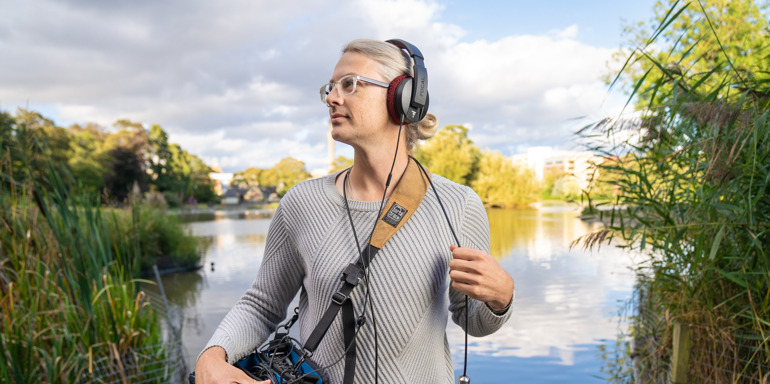The Ivors Academy have announced their nominations for the 2022 Ivors Composer Awards. The awards put a spotlight on some of the UK's most imaginative composers, giving listeners across the country a chance to discover new and experimental music.
David de la Haye, who studied Jazz at Leeds Conservatoire in 2003, has been nominated in the Jazz Ensemble category for his track Plant Based Patterns. We spoke to him about his musical journey since leaving the Conservatoire, his thoughts on the nomination, and his inspiration behind the track.

Photographed by Simon Litherland
Hi David. Where did your musical journey first begin?
I picked up electric bass aged 14. Around the same time, I discovered a fascination for playing with sound and would hang around after school to play the department’s piano. At the time I didn’t consider this ‘composition’ but with my music teacher’s support I had a space where I was free to explore my musicality. This was especially appreciated because, being from a working-class family, I had no access to instruments at home. My fascination with sound and the exploration of alternative modes of music-making continues to this day.
What made you decide to study Jazz at Leeds Conservatoire?
I grew up on the Channel Island of Jersey which has no university so making the trip elsewhere was the only option for anyone wanting to continue to degree studies. I auditioned at a few other institutions but the combination of Jazz and Contemporary offered at Leeds Conservatoire (then Leeds College of Music) fulfilled my desire to learn jazz music theory whilst exploring some of the ‘weirder’ sound palettes of the 20th Century; the introduction to electroacoustic composition became a big influence.
What have you been up to since graduating in 2003?
A lot has happened since graduating back in 2003! I'd have to say highlights include the formation of pioneering folk/electronic crossover group Monster Ceilidh Band (newly reshaped into We Are The Monsters) and joining Jez Lowe and the Bad Pennies. With these groups I have been lucky enough to perform all over the world, including some busy transatlantic tours and a spectacular gig in the rainforests of Borneo.
As a field recordist, I've also produced works for Landlines Project, BALTIC Centre for Contemporary Art, and have embarked on a recent collaborative project for Creative Scotland. I've also completed multiple artist-in-residencies including ArtHouse Jersey and was part of a museum-based team who created an interactive exhibition for COP26 at Glasgow Science Centre. My Hebridean recordings of grey seals vocalising underwater were also archived by the British Library and subsequently used within the award-winning Gaelic documentary film ‘Iorram (Boat Song)’. As a Music Technician I was nominated by Times Higher Education award as ‘Outstanding Technician of the Year’, and my recent album ‘With Ears Underwater’ has been nominated for an Ivor Novello Award.
Can you tell us a bit more about Plant Based Patterns. How did you go about composing this and what was your source of inspiration?
The track Plant Based Patterns emerged from underwater recordings made during a nine-month period in the Sunderland region on the Northeast coast. These recordings were anonymised and presented to a trio of improvising musicians who used them as inspiration for a new repertoire of sounds. The track is largely based on the sounds of aquatic plants that produce hypnotic bubbling rhythms during the process of photosynthesis. Other tracks on ‘With Ears Underwater’ include the sounds of freshwater invertebrates, marine molluscs, and underwater sounds from Sunderland marina. The work originally included a site-specific installation, zine publication, and artist discussion for UN World Water Day curated as part of a Sound and Music Composer-Curator commission.
How did you feel when you heard about the nomination for The Ivors Composer Awards 2022?
The work explores interspecies dialogue through musical improvisation so there is a strong crossover with Free Jazz and improvised music. But the piece might equally be called something like ecological sound art. So, to be nominated in the Jazz Ensemble category was quite a surprise to me! It’s really wonderful to be able to bring these underwater sounds, found in common spaces such as ponds and rock-pools, to wider audiences. There’s a richness of sound under there which is quite fascinating!
What advice would you give to other aspiring jazz musicians?
Make noises, find sounds, and develop a musical language which speaks best to you. If any genre should be defined by the way it has broken down musical conventions, Jazz is that genre.






